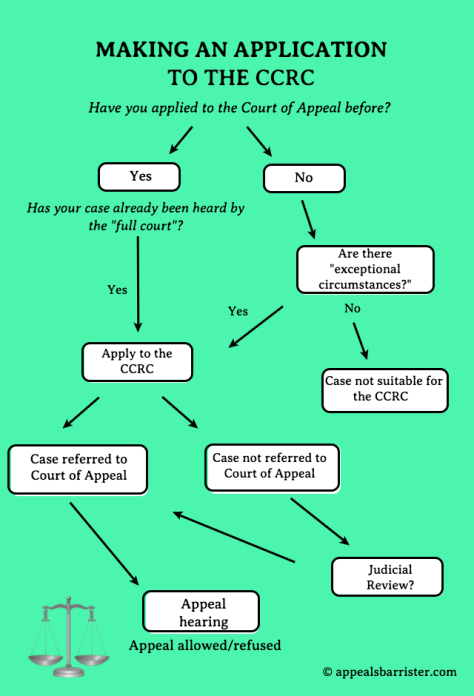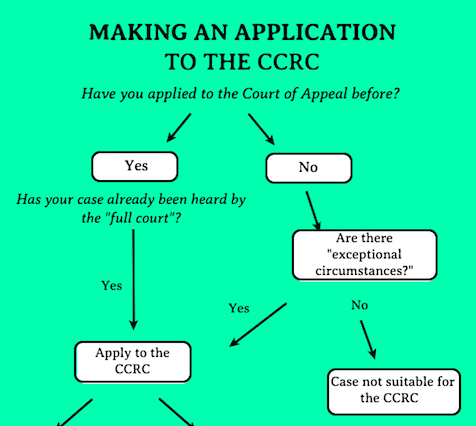What is the CCRC?
The Criminal Cases Review Commission (CCRC) is an independent body that investigates possible miscarriages of justice. It has powers to investigate cases and to refer (send) cases to the Court of Appeal.
Can I apply to the CCRC?
The CCRC can look at convictions from the Crown Court or the Magistrates’ Court. In most cases you will have to exercise your appeal rights before the CCRC will look at your case. If you were convicted in the Magistrates’ Court this means first appealing to the Crown Court. If you were convicted in the Crown Court this means appealing to the Court of Appeal.
This fact sheet focuses on convictions from the Crown Court, which are much more likely to result in applications to the CCRC.
As I explain in the how do I appeal my conviction fact sheet, an application to the Court of Appeal usually has 2 stages. The first is a look at the case “on the papers” by a single judge. The second is asking the “full court” to consider your case. Before applying to the CCRC your case will usually need to have been considered (and rejected) by the full court.
There are some exceptions. The CCRC will sometimes accept cases where you have not already had an appeal. But it will only do so in “exceptional circumstances”.
What is meant by exceptional circumstances?
There is no easy answer to this question. The CCRC guidance say that exceptional circumstances might include cases where:
(1) There is sensitive information involved. This might include, for example, evidence that was not disclosed to you because it was withheld under “public interest immunity” (PII) procedures;
(2) There is new scientific, medical or expert evidence that the CCRC should analyse;
(3) The CCRC might be able to get hold of material that you could not get hold of yourself.
If you are in any doubt about whether there are exceptional circumstances in your case you have nothing to lose (but your time) by making an application to the CCRC. But if you choose to do that you should spell out clearly why you say your case should be looked at by the CCRC rather than the normal route of you making an application to the Court of Appeal.
If the CCRC thinks that there are no exceptional circumstances you will need to make an application to the Court of Appeal.
When will the CCRC refer a case to the Court of Appeal?
The CCRC can refer a conviction to the Court of Appeal if:
- There is a real possibility the conviction would be overturned; and
- This real possibility arises from evidence or argument not put forward at trial or appeal (or there are exceptional circumstances); and
- You have already appealed (or there are exceptional circumstances).
The CCRC can also refer a sentence to the Court of Appeal if:
- There is a real possibility that the sentence would be reduced if it were referred; and
- This real possibility arises from information or argument on a point of law which was not put forward at trial or appeal; and
- You have already appealed or applied unsuccessfully for permission to appeal (or there are exceptional circumstances).
What is meant by a “real possibility”?
This means a real possibility that the conviction will be overturned. The conviction will only be overturned in the Court of Appeal is satisfied that the fresh evidence or argument might have resulted in the jury taking a different decision (the “jury impact” test).
The “real possibility” test has been criticised because it involves speculation on speculation. In other words, it involves the CCRC speculating about what the Court of Appeal might think about how the new evidence/arguments might have influenced the jury.
How should you approach your application to the CCRC?
You should approach an application to the CCRC in much the same way as you would an application to the Court of Appeal. The CCRC has a form that you will need to complete with your application. But it’s usually best to put your arguments in a separate document. You can then simply write “see attached” on page 11 (“what went wrong with your case”).
In telling the CCRC what you think went wrong with your case you might want to follow the suggestions I have set out in the “drafting grounds of appeal” fact sheet. The CCRC deals with a large volume of cases and if you set out your case more clearly it will help them to understand your arguments and increase the chances of a successful outcome.
Your application might contain minor differences in style from a grounds of appeal document. For example your “grounds” section might become a “proposed grounds” section.
Another example might be if you are asking the CCRC to use its powers of investigation. If you have suggested lines of enquiry then you should say what they are. You might then want to have a separate heading for that.
It might look like this:
 What if the CCRC rejects my application?
What if the CCRC rejects my application?
The vast majority of applications are rejected. If the CCRC rejects your application it will issue a “provisional” statement of reasons and allow you an opportunity to make further arguments. It is important that your make your arguments clear and coherent; responding to the Commission’s reasons and not just re-hashing points that you have already made.
If the CCRC still rejects your application the only way of challenging its decision is through an application for judicial review. You can apply again if fresh evidence comes to light, and in fact you can apply to the CCRC as many times as you like. But if you want to challenge a decision and there has been no change in circumstances you can only do so through a judicial review claim.
What is a judicial review?
Judicial review is a process by which the courts have the power to “supervise” decisions taken by public bodies like the CCRC. If the CCRC makes an error of law then you can ask a court to “quash” its decision. If it quashes the decision then the CCRC will have to look at your case again.
It is very difficult to win a judicial review case. You cannot ask the courts to review a decision just because you disagree with it. It has to be wrong in law. There are lots of ways that a decision can be wrong in law, and I won’t set them all out here. But in very general terms you will usually need to show that the decision was “unreasonable”. This means that either (i) the person making the decision has not taken into account something that was relevant, (ii) that s/he has taken into account something irrelevant, or that (iii) the decision is illogical.
A rare example of a successful judicial review is the Ben Geen case. In that case the judge granted “permission” for a judicial review, after which the CCRC agreed to look at the case again. If you are considering a judicial review you should seek legal advice as the law in this area can be very complex.

© Appeals Barrister
